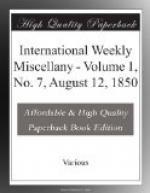[FROM THE LONDON TIMES.]
BIOGRAPHY OF SIR ROBERT PEEL.
In the following brief narrative of the principal facts in the life of the great statesman who has just been snatched from among us, we must disclaim all intention of dealing with his biography in any searching or ambitious spirit. The national loss is so great, the bereavement is so sudden, that we cannot sit down calmly either to eulogize or arraign the memory of the deceased. We cannot forget that it was not a week ago we were occupied in recording and commenting upon his last eloquent address to that assembly which had so often listened with breathless attention to his statesmanlike expositions of policy. We could do little else when the mournful intelligence reached us that Sir Robert Peel was no more, than pen a few expressions of sorrow and respect. Even now the following imperfect record of facts must be accepted as a poor substitute for the biography of that great Englishman whose loss will be felt almost as a private bereavement by every family throughout the British Empire:—
Sir Robert Peel was in the 63d year of his age, having been born near Bury, in Lancashire, on the 5th of February, 1788. His father was a manufacturer on a grand scale, and a man of much natural ability, and of almost unequaled opulence. Full of a desire to render his son and probable successor worthy of the influence and the vast wealth which he had to bestow, the first Sir Robert Peel took the utmost pains personally with the early training of the future prime minister. He retained his son under his own immediate superintendence until he arrived at a sufficient age to be sent to Harrow. Lord Byron, his contemporary at Harrow, was a better declaimer and a more amusing actor, but in sound learning and laborious application to school duties young Peel had no equal. He had scarcely completed his 16th year when he left Harrow and became a gentleman commoner of Christ Church, Oxford, where he took the degree of A.B., in 1808, with unprecedented distinction.
The year 1809 saw him attain his majority, and take his seat in the House of Commons as a member for Cashel, in Tipperary.
The first Sir Robert Peel had long been a member of the House of Commons, and the early efforts of his son in that assembly were regarded with considerable interest, not only on account of his University reputation, but also because he was the son of such a father. He did not, however, begin public life by staking his fame on the results of one elaborate oration; on the contrary, he rose now and then on comparatively unimportant occasions; made a few brief modest remarks, stated a fact or two, explained a difficulty when he happened to understand the matter in hand better than others, and then sat down without taxing too severely the patience or good nature of an auditory accustomed to great performances. Still in the second year of his parliamentary course he ventured to make a




